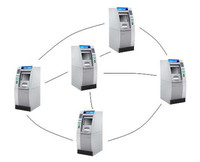
itsowl-InverSa: Intelligente vernetzte Systeme für automatisierte Geldkreisläufe

In recent decades, automation has become an integral part of everyday life. In great variety and ubiquitous, self-service machines make goods, information and services available. From tickets and parcels to supplies such as cash and food, the most diverse areas of life are thus affected. As they become more widespread, users' expectations of availability, usability and reliability are rising accordingly. On the other hand, these services must be provided in a resource- and cost-efficient manner. A particular area of tension here is at self-service systems, where critical, personal information or significant monetary values are processed and, at the same time, availability must be guaranteed 24 hours a day, 365 days a year.
To meet these requirements, services need to be bundled together while new intelligent systems are created. In line with the focus areas of the leading-edge cluster it's OWL, the following four characteristics are crucial here for a new generation of intelligent self-service systems:
- An adaptive adjustment to the existing environment, which is described in particular by the processed media and the operating behavior of the user.
- A predictive action of the system to identify targeted manipulations of the existing processes to take advantage of third parties
- A robust sequence for high process reliability even in unexpected situations, and
- The user-friendly operation of the systems. (Content of a second innovation project of Wincor Nixdorf in it's OWL).
In the joint project InverSa, these properties are being examined using the example of self-service systems for means of payment. The aim of the project is to intelligently network physical cash flows and previously separate information channels. The aim is to ensure a high level of process reliability during operation. The focus is on both unintentional disruptions and targeted manipulations.
Unintentional disruptions include, for example, operating errors (bent, folded or incorrectly inserted banknotes) and the qualitative variance of the media themselves (soiling, mechanical damage). Currently, these bills are removed from the process flow, causing inconvenience for customers and additional costs for the operator.
Targeted manipulations can include, for example, skimming attacks (spying out card data using superstructures) or "cashtrapping" (mechanical blocking of the cash dispensing slot). A particular difficulty with manipulation is that the types of attacks are always evolving and scenarios are difficult to predict.
For both described types of deviations from normal operation, an exact prediction of the parameters and influencing conditions is almost impossible. Therefore, the solutions developed must be adaptive, predictive, and robust in dealing with unexpected influences. For example, the intelligent self-service machine should be able to deal autonomously with an unexpectedly high volume of damaged bills (e.g., a fair). At the same time, it must be possible to clearly distinguish this from an imminent attack or attempted manipulation. This is to be realized by a special mechatronic solution for handling the means of payment and the networking of existing information channels (e.g. counter readings, surveillance cameras, vibration sensors, ...) in the environment of a self-service system.
The combination of these solutions results in a particularly high leverage effect for process and manipulation security at self-service systems. The joint project thus sets a new level worldwide for commercial banks and retailers in cash logistics and provision. In this area in particular, a major boost to international competitiveness can be expected.
